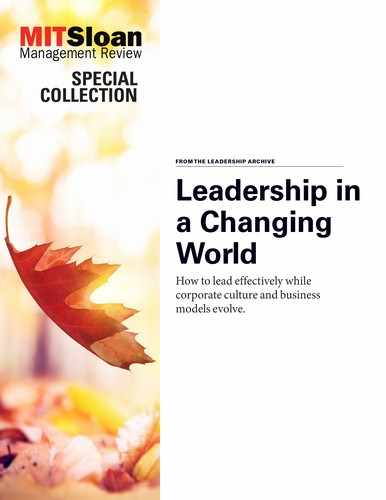The challenges of leading are different today than they were 20 years ago. Technology is a part of organizations in entirely new ways, and workforces made up of a mix of millennials and, increasingly, older people have new kinds of demands and expectations. This collection of articles from MIT Sloan Management Review looks at what executives need to do to guide their companies through periods of major change.
From “How to Become a Game-Changing Leader”:
- Business leaders need to learn how to build companies that are simultaneously purpose-driven, performance-focused, and principles-led.
- Being performance-driven is clearly essential to success, but focusing on results is not enough. Today’s workforce demands a set of operating principles characterized by core values such as transparency, trust, inclusion, and real-time collaboration. Millennials, especially, are deeply motivated by corporate social responsibility and a compelling sense of purpose.
- It’s a challenge to execute all three principles because people see events and actions through different lenses and sometimes with conflicting goals.
- To guide their companies through periods of major change, senior executives must combine traditional leadership skills with five specific mindsets that help them balance the tensions inherent in leading organizations through complexity.
From “Why Your Company Needs More Collaboration”:
- Research by MIT Sloan Management Review finds that a focus on collaboration — both within organizations and with external partners and stakeholders — is central to how digitally advanced companies create business value and establish competitive advantage.
- Fewer than half of the respondents to MIT SMR’s 2016 digital business survey agreed or strongly agreed that “our organization is increasingly organized around cross-functional project teams, not necessarily functions and divisions, to implement digital business priorities.”
- Digitally advanced organizations recognize and reward collaboration and cross-functional teams — nearly 77% of digitally advanced businesses do, versus 34% of the least digitally sophisticated group of companies.
- Increasing collaboration means having to change work practices, behavioral norms, and metrics of success — in short, adapting essential elements of a company’s culture.
From “Who’s Building the Infrastructure for Lifelong Learning?”:
- The traditional concept of a “three-stage life,” made up of three distinct periods of full-time education, full-time work, and then full-time retirement, is clearly untenable over a long life.
- With people living and working longer than ever, there must be a way to promote regular education.
- In a dynamic labor market, where jobs and skill requirements are no longer static, accurate anticipation is key. Anticipation helps people gauge which jobs may be at risk and identify the jobs that are being created. Knowing how jobs may morph and expand creates a basis for personal planning and acts as a motivator to learning.
- Anticipating jobs and providing access to lifelong learning demands a complex system involving multiple stakeholders: educators who extend the reach of their programs to students of all ages; governments that commit to helping citizens understand future job markets and the skills they will require, and then realign tax and financial incentives accordingly; and corporations that create work environments that enable employees to engage in extended periods of training.
From “The End of Corporate Culture as We Know It”:
- Traditional hierarchies of the corporation are being supplanted by self-organizing systems collaborating on digital platforms.
- As a result, corporate culture may not matter as much in the future — at least not in the ways we conceive of it today.
- In this world, people’s relationships to institutions will become increasingly defined by the activity in which they are engaged at any given time. They will come to view themselves as “affiliates” more than “employees,” encountering new partners and colleagues on a rolling basis.
From “Three Meaningful Strategies for Managing Rapid Change”:
- Adapting to a changing world is hard, partly because organizations (and most people) aren’t prone to change when things are going well.
- But organizations can find new ways to be nimble and adaptive, and to avoid the trap of becoming saddled with legacy processes.
- One strategy: Instead of striving to change organizational cultures head-on, leaders should visibly give permission to those parts of the organization that deliver results differently and better — and reward them for doing so.
- Another strategy: Adapt the practiced values and goals of an organization to the changing world instead of attempting to change mission statements.
..................Content has been hidden....................
You can't read the all page of ebook, please click here login for view all page.
